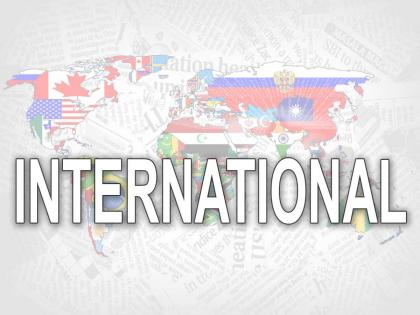Action against Tahafuz Pashtun Movement is Pakistan's state terrorism
By ANI | Published: January 29, 2020 02:21 PM2020-01-29T14:21:05+5:302020-01-29T15:15:17+5:30
Twenty-three people still in detention in Islamabad with charges of sedition, other PTM members and supporters were arrested in Bannu. A lawmaker, Mohsin Dawar, was brutally dragged by police, thrown into a car and detained for a couple of hours.

Action against Tahafuz Pashtun Movement is Pakistan's state terrorism
Rome [Italy], Jan 29 : Twenty-three people still in detention in Islamabad with charges of sedition, other PTM members and supporters were arrested in Bannu. A lawmaker, Mohsin Dawar, was brutally dragged by police, thrown into a car and detained for a couple of hours.
This is the final balance of a day of peaceful demonstrations held all over Pakistan by the Tahafuz Pashtun Movement and members of other opposition political parties who joined the demonstrations calling for the release of Manzoor Pashteen, the PTM leader arrested a day before and sent for 14 days of judicial custody with charges of sedition.
Pashteen has been denied bail and is soon to be transferred into another jail. Human rights orgsations, Afghan President Ashraf Gh and his predecessor Hamid Karzai, between others, have been calling in vain for the release of Pashteen.
According to Kushal Khattak, a Pashtun activist, who witnessed the entire episode and started tweeting the events, "The Islamabad Police knew what it was doing. They laid a barbed wire around the protestors. They increased their number and brought their truck. They then attacked the protest barbarically."
Dawar, in a brief video shot into the police van while they were driving him away, commented, "Such arrests will not prevent us from showing the true face of this state to the world". Dawar, along with Ali Wazir, who is another PTM lawmaker, has been detained for months without clear charges in connection to another barbaric episode now known as "Khar Qamar massacre".
Last May, in fact, the Army attacked a peaceful PTM demonstration at a checkpoint, leaving on the ground fifteen people and wounding more than fifty. Dawar and Wazir, who were leading the demonstration, had been taken into custody and remained there for months despite the calls for their release.
"This is state terrorism," commented former lawmaker Afrasiab Khattak, who took part in the protest and said, "The way they dragged people, including Ali Wazir and Mohsin Dawar, the sitting members of parliament, to police vans, said it all."
Army and Police have been staging for the umpteenth time crackdowns on peaceful demonstrators, exposing once more their strategy -- they are desperately trying to provoke a violent reaction amongst the protestors so they can open fire and freely crush the movement fitting it into their narrative of terrorism and sedition.
But it will not happen. However, the situation is more than worrying. In a while, if you listen to the official narrative, traitors will outnumber ordinary citizens in Pakistan. Baloch, Pashtuns and Sindhis, basically whoever raise his voice for civil and human rights, whoever asks for the end of enforced disappearances, for the end of dump and killing, the end of extrajudicial executions is labelled a 'traitor' and charged with sedition.
Whoever dares to criticise the real rulers of the country, the Army, ends up dead or in jail. This is because criticising the Army in Pakistan is a dangerous exercise. Especially when, as the PTM does, the state is accused of playing a double game in the so-called fight against terrorism.
The same accusations, in fact, the West has been raising in Islamabad for years. Accusations to which, as usual, Islamabad first responded by accusing the Pashtuns of being played by 'foreign agitators' and later releasing a handful of activists. The PTM has not stopped, and will not stop, say its leaders, until justice is done.
Islamabad is playing with the fire -- the government makes some concessions but continues to censor newspapers and televisions regarding the Pashtun protests, arrests the leaders of the movement, prevents it from leaving the tribal areas and even puts them on the no-fly list. When it does not accuse them, as it happens for the Balochis, to be instruments in the hands of the usual 'foreign powers'.
The number of people who took to the streets in the past days, however, tells a different story. A story from which Islamabad apparently has learned nothing at all -- such a peaceful movement for human and civil rights, launched by the inhabitants of the then East Pakistan who were victims of the same kind of abuse, has been forcibly suppressed and has finally led to the birth of Bangladesh.
If the government and the Army will force Pashtuns to abandon their peaceful protests and to join the armed resistance that operates, for example, in Balochistan, the consequences for Pakistan could be devastating and divide once again the country.
(Disclaimer: The views expressed in this column are strictly those of the author)
( With inputs from ANI )
Open in app